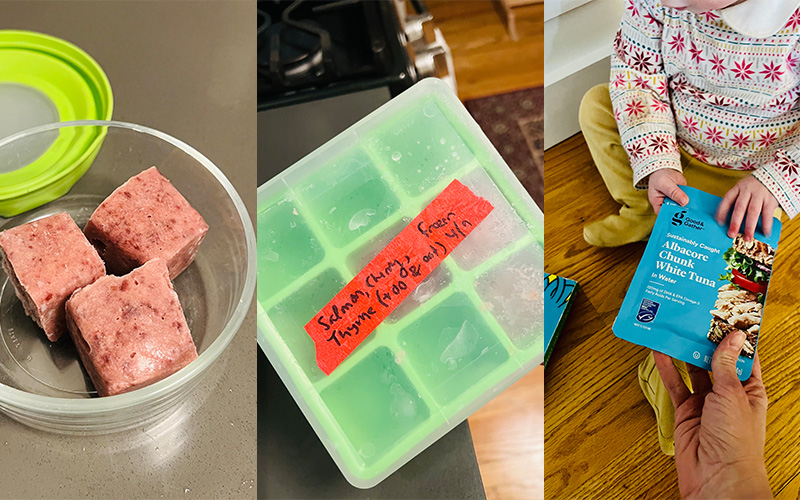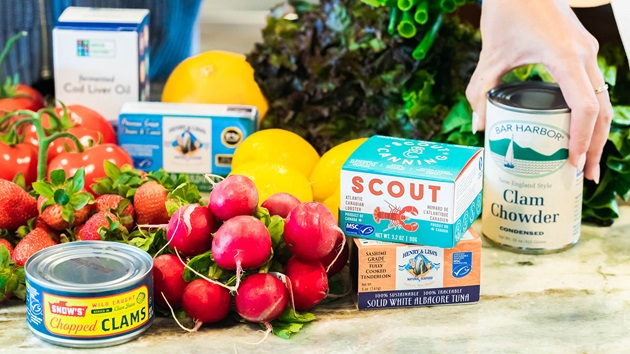Do you make New Year’s resolutions or set intentions for a new year? For many, the new year brings an opportunity to renew commitments to themselves, their families, and even their planet. If you've got "make more sustainable choices on your list" then we've got you covered!

Here are 5 simple tips to live a more sustainable lifestyle in 2024.
And remember, small changes can make a big impact.
1. Be more mindful about how your seafood is caught
In early 2022, 68% of North American seafood consumers agreed that, in order to protect the ocean, seafood must come from only sustainable sources. To identify ocean-friendly seafood, one place to start is by looking at the labels in stores, on packs, and on restaurant menus. Be wary, though—not all sustainability claims are created equal.
Make sure that you’re looking for logos from credible third-party certification programs like the Marine Stewardship Council or the Aquaculture Stewardship Council. When you see these labels in-store, you can trust that the seafood product you are purchasing comes from a certified sustainable fishery or certified responsible farm and directly supports a healthier ocean.
2. Reduce food waste by cooking more at home
During the pandemic, a record number of families began cooking at home more frequently. While we love being able to eat out again, there are several benefits to cooking your own meals! In addition to the health benefits, it can also be the eco-friendlier choice. When you cook your own meals, not only can you choose where and how your ingredients were sourced but you can also control things like packaging, plastic waste, and overall reduction of the over 168 million tons of food waste produced in North America annually.
You might even invest in an at-home composting system or choose to use your discarded veggie ends to make a nice broth. When cooking at home, the opportunities for eco-friendly innovation are endless!
3. Look for and purchase certified sustainable products
Whether you’re looking to consume more sustainably or support fair labor practices, there are several certification programs and associated ecolabels out there to help you identify products that match your ethos, like Fairtrade Certified or Non-GMO Project Verified.
As we said earlier, not all claims are created equal.
If you are uncertain about the validity or accuracy of a sustainability claim or logo, take a few minutes to do a little research. Is the label created and self-awarded by the brand itself? Is it from a rigorous independent certification program that can back up the claim?
Navigating the ecolabel space can at times be tricky and confusing, but with a little patience and time, you can get better at weeding out the questionable claims!
4. Buy less, consume less, throw away less
A new product might not always be the answer. Whether it’s food, drinks, clothing, or other items, we could all stand to slow down our purchasing habits. While shopping, ask yourself “Is this necessary? Does this have a unique purpose in my life? Can I see myself actually using this item?” Incredibly, stopping to ask yourself these simple questions before making a purchase can have a huge impact on the pure amount of stuff that you collect.
There are also plenty of ways to shop without buying new things. Don’t be afraid to explore alternative options including thrifting, swapping, or bartering. In fact, there are several Facebook groups dedicated to “Buy Nothing” communities in which people can offer and receive items at no cost while also reducing their overall waste. There is also no shortage of Instagram-based sellers covering a wide array of pre-loved items.
If you're looking to reduce waste, consider items that can be mended, repurposed, or recycled before you throw them away. When you’re considering throwing out an item, remember that you’re also throwing away the energy and resources that went into making it originally. Upcycling is a great way to avoid the trash, and a little creativity goes a long way. It can be a fun challenge to explore alternate uses for products that have served their primary purpose. An old mug that you can’t use for beverages anymore could make a cute planter for succulents; a pair of old jeans can be reimagined into a simple rucksack.
5. Use more public transportation
It’s no big secret that public transportation and other car alternatives help to reduce overall energy consumption and damaging carbon emissions. Get familiar with your local metro, subway, bus, or train system. As technology advances, more single-rider alternatives including bike and electric scooter rentals are becoming available in major cities across North America.
Can’t escape the car? Try finding coworkers with whom you can carpool to reduce your overall environmental impact. Finally, don’t forget the simple and powerful (and healthy, to boot!) act of incorporating more walking into your commute, if possible.
Bonus tip: Just get started!
Even the smallest of changes can make a huge difference. Whether you can incorporate one or all of these sustainability tips into your life in 2024, you’ll be doing your part to make the world a better place.



